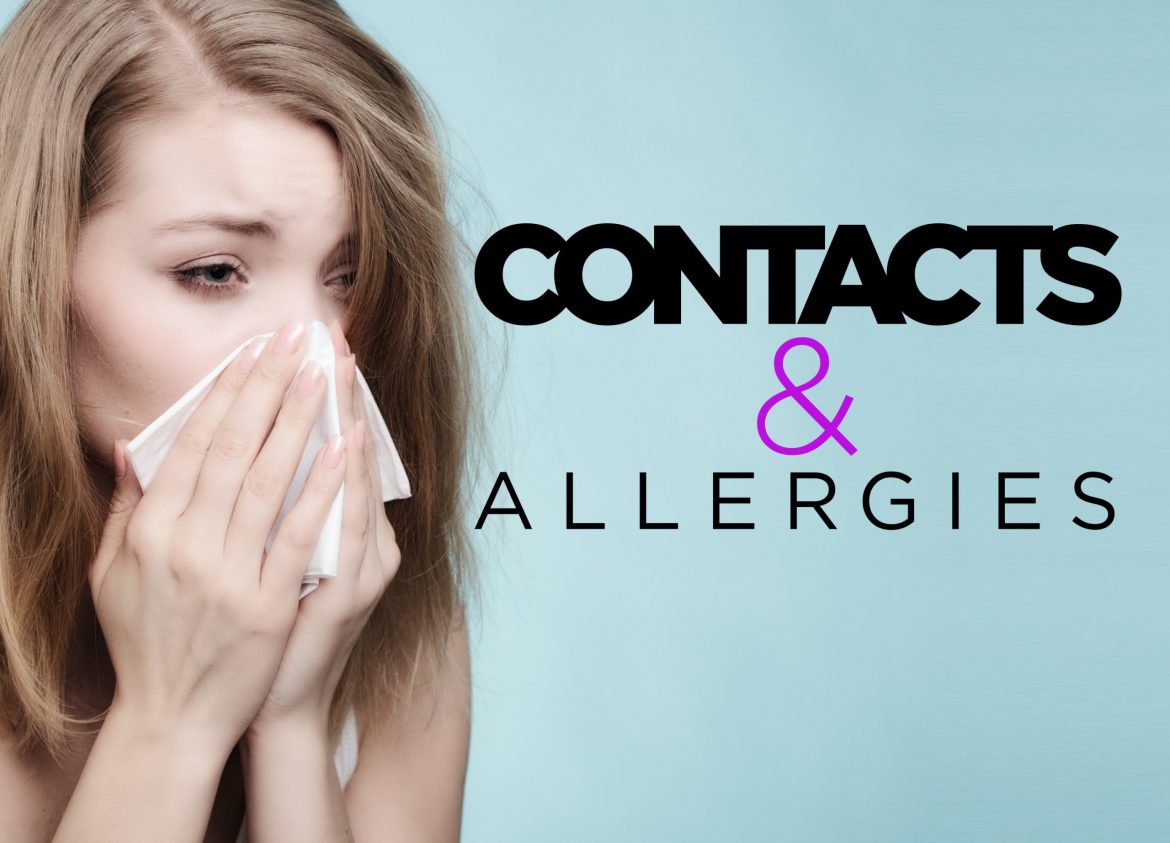![]()
Most people consider spring to be when allergy season strikes. Tree pollen hits hardest come early spring, but is then followed by grass pollen in the late spring, weed pollen in the summer, and ragweed pollen in the late summer and deep into fall.
And, according to Purvi Parikh, MD, an allergist and immunologist with Allergy & Asthma Network, it’s always allergy season because, in addition to lengthy pollen seasons, year-round offenders include dust mites, mold, and pet dander.
Allergies are especially hard on contact lens wearers
It’s bad enough you wake up and your eyes feel gritty, swollen, and itchy. Then you have to put in your contact lenses. Ouch.
According to the American Optometric Association, there are approximately 45 million contact lenses wearers in the United States. Many cease wearing contact lenses due to seasonal allergies. Some stop only temporarily, while others throw in the towel and give up on wearing contacts.
But you don’t have to. Understanding the symptoms and treatment options available can bring relief and help you weather allergy issues.
The symptoms you may suffer
An allergy occurs when the body’s immune system overreacts and sends out antibodies to combat the allergen. In the case of your eyes, when the antibodies are released, they attach to cells that release histamine and other chemicals. This results in the blood vessels leaking, which causes any or all of the following symptoms associated with an eye allergy:
- Excessive watering
- Redness
- Inflammation
- Burning
- Itching
Additional symptoms associated with seasonal allergies not solely relegated to your eyes include:
- Sneezing
- Ear and sinus congestion
- Itchiness of the throat, ears, and nose
- Runny nose
- Postnasal drip
- Dark circles beneath the eyes
- Puffiness
Treatment options for contact lens wearers
The simplest way to alleviate eye irritation associated with allergies is to try to eliminate or avoid the allergen altogether. That means staying indoors when the pollen count is high or using air conditioning (with a clean filter) at home and in the car. Keep the windows closed and the humidity low to avoid mold. Clean floors and surfaces frequently and wash your hands frequently, too, especially if you’re exposed to a known allergen such as a pet or grass.
Over-the-counter oral antihistamines might bring you some relief, but if you still find seasonal allergies giving you trouble with your contact lenses, try the following treatment options:
Cry it out
For some, allergies can cause watery eyes. For others, especially those who wear contacts, the eyes might become dry and irritated.
Enter artificial tears.
Artificial tears can be your eyes’ best friend during allergy season. Not only do they keep the eyes lubricated, but they can help clean out and wash away any allergens that might build up on your contact lenses. The more frequently you use them, the better, as using artificial tears with more frequency will give allergens less of a chance to stick to the surface of your contact lenses.
According to the American College of Allergy, Asthma & Immunology, artificial tears “are safe and can be used as often as needed.”
Hands off!
Resist every temptation to rub your eyes when they feel itchy. Doing so will only exacerbate allergy symptoms by spreading allergens and increasing inflammation. To relieve swelling and itching, apply a cold compress to your eyes. Another trick is to store your artificial tears in the fridge to deliver a cooling effect when you drop them into your eyes.
Clean well and often
During allergy season, you may want to clean your contacts a few more times than usual to help keep them free of allergens.
Skipping out on your normal contact lenses cleaning routine provides more opportunities for allergens to build up your contacts, leading to more opportunities for your eyes to become irritated.
A common tactic for many is switch to daily disposable contact lenses when allergy symptoms get bad.
If you already wear disposable contacts, you may want to invest in a few extra pairs and switch them out more frequently. Of the 45 million people who wear contacts, over 90 percent wear soft contacts, which are magnets for allergens. Because you discard daily disposable lenses at the end of every day or multiple times a day, allergens are less likely to build up and cause eye irritation.
Give your eyes a break
If your allergies are really bad or you’re not in a position to clean or change your lenses multiple times a day, try a temporary switch to prescription eyeglasses—maybe for a few weeks—until your allergy-stricken eyes calm down.
Consult with an expert
If you are not finding any relief no matter what you do, schedule an appointment with your eye doctor. He or she may prescribe you eye drops specifically for allergy relief.
Scheduling an appointment with an allergist might also be a good idea, as he or she can pinpoint exactly what it is you’re allergic to, as well as assist in prescribing effective management and treatment options.
Considering contact lenses for the first time?
This article will help you make the right decision.
Do you have more questions regarding contact lenses?
Get answers on our CONTACT LENSES FAQ.

